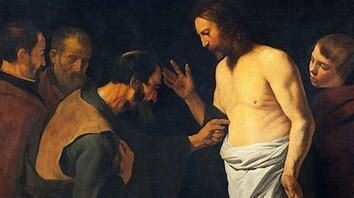Second Sunday of Easter
Sunday of Divine Mercy
April 24, 2022 – Year C
Readings: Acts 5:12-16 / Ps 118 / Rev 1:9-11a, 12-13, 17-19 / Jn 20:19-31
by Rev. Louis Benoit, Guest Celebrant
In the gospel for today, I think we need to be in touch with the apostles in that closed-off room on this first Easter Sunday night. The gospel tells us they were afraid; they were in there because of fear of the Jews. Jesus had just been crucified, and they were His followers. The Jewish people could be after them for the same reason.
Besides fear, there was probably a great deal of confusion. Jesus had been crucified. What were they going to do? Where were they going to go? They’d heard news about the empty tomb, but they hadn’t seen Jesus or anything like that. They were probably very confused.
They probably had a certain amount of guilt, too. In Jesus’ hour of suffering, they slept through it, and when He was taken away, they ran away. So there was probably a certain amount of guilt.
Fear. Confusion. Guilt. They were huddled in that closed room with the locked doors. In the midst of that, Jesus ends up standing among them. The first thing He says is, “Peace be with you.” And He repeats it.
What is peace? Peace is when creation is ordered as God would have it. The tranquility of order; that’s peace. Those people He was standing among were in serious need of peace.
Then He tells them, “As the Father has sent me, so I send you.” Jesus was sent, then He preached the Gospel of peace, justice, and love, against the reign of sin, evil, and death. And with His death and resurrection, it is now the responsibility of His followers to continue His mission. “As the Father has sent me, so I send you.”
He doesn’t send them forth alone. He says to them, “Receive the Holy Spirit.” That’s another aspect of resurrection existence: The Spirit that animated Jesus in His lifetime, through His death and resurrection, is now passed on to His followers. And so they don’t go off alone to do the work of Jesus. The very Spirit of Jesus is with them as they continue that work.
But before He says, “Receive the Holy Spirit,” the gospel says He breathed on them. That’s a symbol that could be easily missed. To understand that symbol, you have to go all the way back to the beginning: the Book of Genesis and creation. When God creates the human, He makes the human out of the mud of the earth. But the human only becomes human when God breathes God’s life into the human. And what that is a symbol of in Genesis is that the human is of the earth and of God. That’s how all human beings are: We’re of the earth and we’re of God.
The fact that Jesus breathes on His apostles is saying He’s breathing new life into them. They are a new creation in Christ Jesus. That’s the meaning of Jesus’ breathing on them.
He does that before He says, “Receive the Holy Spirit.” Thus they are commissioned to continue the work of Jesus.
The Bible is the living word of God for us today. So that’s not just written about the apostles on the first Easter; it’s written about us. Jesus says to us, “As the Father has sent me, so I send you.” Those are words to us today. And “Receive the Holy Spirit.” We have received the Spirit of Jesus in Baptism and Confirmation. That Spirit is constantly being renewed in Eucharist. And so this gospel is not just about the apostles; it’s about us and what our responsibilities are.
It’s also significant that we have the doubting Thomas in the gospel. Thomas who doubts: He’s not there when Jesus comes. They say, “We have seen the Lord.” And he says, “I’m not going to believe until I touch Him, until I feel the wounds in His hands and touch the wound in His side. I’m not going to believe.” A week later, Thomas is there, and Jesus comes. Thomas sees Jesus’ wounds, and he touched the wounds, and he makes the comment, “My Lord and my God.”
A lot of scripture scholars say that this Easter appearance to the apostles was the conclusion of the Gospel of John; the appearance by Jesus at the Sea of Tiberius was a later addition to the gospel. And so Thomas’ professing, “My Lord and my God,” is the apostles’ coming to full faith. Thomas is speaking, but it’s in the name of all the apostles, proclaiming the risen Jesus: “My Lord and my God.” It’s a culmination of their faith. It’s the final profession of their faith in the presence of the risen Jesus: “My Lord and my God.”
Of course, as we are called to continue the ministry of Jesus, we are called (“As the Father has sent me, so I send you”), with the grace of the Spirit we have received, to give the spirit of Jesus to others, and we can say like Thomas, “My Lord and my God!”
 540-586-8988
540-586-8988 

